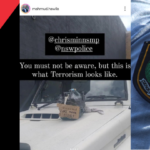Harassment of Women as a Hate Crime

Nottinghamshire has always had a reputation for finding unusual ways for good to triumph over bad – perhaps it’s the ‘Robin Hood’ influence on the county’s history.
This week, Nottinghamshire Police are making global headlines for their decision to treat street harassment, unwanted physical and verbal engagement, taking photos without consent, and other misogynistic incidents as hate crimes.
The decision is the result of a plan made at the Nottinghamshire Safer for Women Conference hosted by the Nottinghamshire Police at the district’s women’s centre, last year.
Coincidentally Sarah Teale, a female BBC reporter, was verbally harassed on camera by a passer-by while covering the conference.
The decision has also been influenced by research in 2014 which examined how local citizens view hate crime.
The new definition of hate crime is:
“simply any incident, which may or may not be deemed as a criminal offence, which is perceived by the victim or any other person, as being motivated by prejudice or hatred.”
Misogyny as hate crime
“Misogyny hate crime” is defined as:
“incidents against women that are motivated by an attitude of a man towards a woman, and includes behaviour targeted towards a woman by men simply because they are a woman.”
In addition to the new definitions, police have implemented new policies, training packages, and communication strategies to help recognise and handle cases involving misogyny.
Local police have been working with the Nottingham Women’s Centre to train call centre staff, force control staff and officers on the beat to recognise misogynistic hate crime and develop ways to tackle it.
Officers are also looking at how complainants can be supported, or if anything can be done to help prevent them from being targeted again.
Police say domestic abuse will not be recorded as a hate crime because it has its own procedures.
Melanie Jeffs, centre manager at Nottingham Women’s Centre, said:
“We’re pleased to see Nottinghamshire Police recognise the breadth of violence and intimidation that women experience on a daily basis in our communities.”
Chief Constable Sue Fish hopes the new definition will make the county a safer place for women.
Tackling ‘unacceptable’ behaviour
“What women face, often on a daily basis, is absolutely unacceptable and can be extremely distressing. Nottinghamshire Police is committed to taking misogynistic hate crime seriously and encourages anyone who is affected by it to contact us without hesitation”, Ms Fish said.
The new rules mean abuse and harassment which might not be captured by the general criminal law can be acted upon, and support offered for complainants.
Violence and intimidation
“Recording this as a hate crime will give us a detailed picture of how often, when and where it is happening. It has been very difficult to build that picture before but we will now get detailed data to analyse”, Ms Fish added.
“Showing that the police take it seriously will also give people the confidence to come forward and report offences.”
The department hopes to steadily influence cultural change.
What is a hate crime?
Hate crimes are generally motivated by hostility or prejudice towards an aspect of a person’s identity.
Police forces in England, Wales and Northern Ireland annually monitor five strands of hate crime: Disability, Gender identity, Race, ethnicity or nationality, Religion, faith or belief or Sexual orientation
Forces can include their own definition of a hate crime with several recently adding sub cultures.
In Australia
Section 20D of the Anti-Discrimination Act 1977 (Cth) makes it an offence to engage in ‘serious racial vilification’, which is defined as a public act which incites hatred, serious contempt for, or severe ridicult of, a person or group based upon race.
Such conduct can include:
- threatening physical harm towards, or towards any property of, the person or group of persons, or
- inciting others to threaten physical harm towards, or towards any property of, the person or group of persons
The maximum penalty for the offence is 6 months imprisonment and/or a $5,500 fine.








